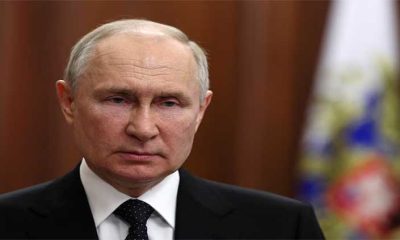Suspected Israeli airstrikes in Syria in recent weeks have killed two Iranian military advisers, temporarily put the country’s two largest airports out of service, and raised fears of regional escalation.
While Israel has fought a shadow war with Iran in Syria for years, it has intensified recently, with near-daily airstrikes attributed to Israel by Syrian officials over the past week.
The escalation of attacks comes after what appears to be a rare infiltration by an armed man from Lebanon into Israel and Iran’s reconciliation with regional rival Saudi Arabia last month. It also comes against the backdrop of a major domestic crisis in Israel over Prime Minister Benjamin Netanyahu’s government plan to overhaul the judiciary.
Israel, which has vowed to stop Iranian entrenchment in neighboring Syria, has carried out hundreds of strikes on targets in government-controlled parts of that country in recent years — but rarely acknowledges them. Since the beginning of 2023, Syrian officials have attributed 10 strikes on Syrian territory to Israel, including four airstrikes within five days as if Tuesday.
The United States, Israel’s closest ally, has had its own recent run-ins with Iranian forces in Syria. In late March, US forces retaliated with airstrikes on sites in Syria used by groups affiliated with Iran’s Revolutionary Guards following a suspected Iran-linked drone attack that killed a US contractor and wounded six other Americans in northeast Syria. An official with an Iranian-backed group in Iraq said the U.S. strikes killed seven Iranians.
The flareup between the U.S. and Iran did not escalate, but some fear the back-and-forth between Israel and Iran could.
Since the early years of Syria’s 12-year-old conflict, Iran has deployed hundreds of military advisers as well as thousands of Iran-backed fighters from countries including Iraq and Lebanon who helped tip the balance of power in President Bashar Assad’s favor. Iran-backed fighters are deployed in different parts of Syria.
Israel has long considered Iran to be its top enemy, citing Iranian calls for Israel’s destruction, its support for anti-Israel militant groups like Hezbollah and its nuclear program. Israel and Western countries say Iran is trying to develop a nuclear weapons — a charge Iran denies.
Iran has blamed Israel for attacks on its territory, including the killings of some of its nuclear scientists and damage to nuclear installations.
The airstrikes in Syria reflect Israel’s concerns about fighters being deployed close to its northern border and fears that Iran is trying to transfer sophisticated weapons, such as guided missiles, to Hezbollah. Both Israel and Hezbollah have avoided an all-out war since their 34-day war in 2006 ended with a draw. Israel considers Hezbollah, which is believed to possess over 130,000 rockets and missiles, to be a major threat.
Lebanese military expert and former army general Hisham Jaber said Iran has about 1,800 military advisers in Syria, most of them deployed with Syrian troops.
The increase in strikes on Syria began with a Jan. 2 attack that temporarily put Damascus airport out of service, just after the most right-wing government in Israel’s 74-year history took office.
The strikes continued despite mass protests in Israel, including open disagreement between Netanyahu and his defense minister, Yoav Gallant, over the government’s controversial plans for a judicial overhaul. At one point, Netanyahu fired Gallant for criticizing the plan, but then backtracked and temporarily halted the push for the overhaul until parliament reconvenes in a month.
The two men have made a number of public appearances in recent days, alluding to military activity in Syria without overtly confirming it.
“We will not allow the Iranians and Hezbollah to harm us. We have not allowed it in the past, we won’t allow it now, or anytime in the future,” Gallant said this week. “When necessary, we will push them out of Syria to where they belong – and that is Iran.”
Jaber, however, said he believes the recent strikes will not turn into a full-blown conflict, in part because the US – which is preoccupied with the ongoing war in Ukraine and its own tensions with China – would try to dissuade a regional war.
Strikes attributed to Israel in Syria in recent weeks have targeted both Iranian-linked figures and infrastructure.
They have hit the airports of Damascus and Aleppo, a move which was apparently intended to prevent the flow of arms shipments into Syria, but which also disrupted aid shipments after the deadly Feb. 6 earthquake that struck Syria and Turkey.
On Feb. 19, the first reported Israeli strikes after the earthquake targeted residential areas in Syria’s capital Damascus, killing at least five people and wounding 15. Opposition activists said the strikes targeted Iranian-backed militias.
In mid-March, the Israeli army said its soldiers had killed an armed man suspected of entering the country from Lebanon and blowing up a car. The incident, which wounded one Israeli, unnerved Israelis. Officials suspect the man infiltrated from Lebanon and may have been dispatched by Hezbollah or directly by Iran.
A few days after the alleged infiltration, a commander with the Palestinian militant group Islamic Jihad was shot dead outside his apartment building near Damascus in what the group described as an assassination by Israeli agents.
Last Tuesday, Netanyahu said Israel’s intelligence agency Mossad helped Greece prevent a terrorist attack planned against at least one Jewish site in Athens. Greek authorities said two men described as being of Pakistani origin were arrested for allegedly planning an attack on a Jewish center.
On Friday, an Israeli strike on a southern suburb of Damascus killed two advisers from Iran’s Revolutionary Guard. Hours later, Israel’s air force shot down a drone that entered Israel from Syria and alleged that Iran was behind its launch.
Yoel Guzansky, an Iran expert and senior fellow at the Institute for National Security Studies, a Tel Aviv think tank, said Israel’s stepped-up action in recent weeks could be in response to the recent alleged infiltration from Lebanon.
Guzansky noted that Iran rarely acknowledges the death of its officers and advisers as quickly as it did after Friday’s attack. He said the swift public acknowledgement could signal that “Iran will avenge or respond to the Israeli attacks,” possibly targeting Israelis abroad.
An official with an Iran-backed group in the region warned that if Israel continues with the strikes, Tehran and its allies will retaliate. He spoke on condition of anonymity because he was not authorized to discuss the issue with the media.
Iran’s semi-official Tasnim news agency quoted the Revolutionary Guard as saying that the killing of two Iranian advisers “will definitely not pass without retaliation.”
Post Views: 128


 Fashion3 months ago
Fashion3 months ago
 Sports3 months ago
Sports3 months ago
 Sports3 months ago
Sports3 months ago
 Fashion2 months ago
Fashion2 months ago
 World3 months ago
World3 months ago
 pakistan3 months ago
pakistan3 months ago
 pakistan3 months ago
pakistan3 months ago



















